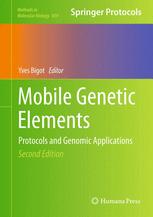Mobile Genetic Elements: Protocols and Genomic Applications 2012
دانلود کتاب پزشکی عناصر ژنتیکی موبایل: پروتکل ها و برنامه های ژنتیکی
| نویسنده |
Yves Bigot |
|---|
| تعداد صفحهها |
308 |
|---|---|
| نوع فایل |
|
| حجم |
7 Mb |
| سال انتشار |
2012 |
89,000 تومان
عناصر قابل انتقال بهعنوان ابزارهای ژنتیکی برای تشریح عملکرد یک ژن خاص و روشن کردن مکانیسمهایی که منجر به تغییرات و تنوع ژنتیکی میشوند و تأثیر تکاملی mtDNA بر زیستشناسی و رشد یک ارگانیسم استفاده میشوند. در عناصر ژنتیکی متحرک: پروتکلها و برنامههای ژنومیک، ویرایش دوم طیف وسیعی از استراتژیها و پروتکلها را برای شناسایی عناصر قابل انتقال (TEs) و مشتقات تکاملی آنها و مطالعه ساختار ژنوم، عملکرد و تکامل گرد هم میآورد. . فصلها که در قالب مجموعههای بسیار موفق روشها در بیولوژی مولکولی TM نوشته شدهاند، شامل انواع توضیحات دقیق و نکات اجرایی ضروری برای دستیابی به بهترین نتایج در آزمایشگاه است.
عناصر ژنتیکی موبایل: پروتکلها و برنامههای ژنومیک، ویرایش دوم به دانشمندان در مطالعه مداوم ابزارها، استراتژیها و پروتکلها در سیلیکون کمک میکند. /i> اصل موضوع: پروتکل ها و برنامه های ژنتیکی مکمل مواردی هستند که در جلد اول توضیح داده شده است.
Transposable elements are used as genetic tools for dissecting the function of a specific gene and elaborating on mechanisms leading to genetic change and diversity, and the evolutionary impact of mobile DNA on the biology and evolution of organism. In, Mobile Genetic Elements: Protocols and Genomic Applications, Second Edition gathers a wide array of strategies and protocols for identifying transposable elements (TEs) and their evolutionary derivatives, and for studying genome structure, function, and evolution. Written in the highly successful Methods in Molecular BiologyTM series format, the chapters include the kind of detailed description and implementation advice that is crucial for getting optimal results in the laboratory.
Through and intuitive Mobile Genetic Elements: Protocols and Genomic Applications, Second Edition aids scientists in the continuing study of in silico tools, strategies and protocols that are complementary of those described in the first volume.



